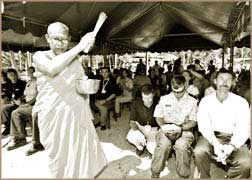 |
|||
|
|
Religious perspective of tsunami tragedy
by Lionel Wijesiri, Lanka Daily News, Feb 2, 2005
Colombo, Sri Lanka -- A disaster like tsunami does more than shake up the world; it shakes up our worldview. It forces us to ask many difficult questions: Why? Why us? What have we done to deserve a punishment like this?
 << A Thai Buddhist monk sprinkles holy water during the blessing ceremony of the new Wall of Remembrance for tsunami victims in Mai Khao on the tsunami-hit Thailand?s island of Phuket. Reuters
<< A Thai Buddhist monk sprinkles holy water during the blessing ceremony of the new Wall of Remembrance for tsunami victims in Mai Khao on the tsunami-hit Thailand?s island of Phuket. Reuters
There are two distinct yet interrelated ways of answering these questions: Scientific viewpoint and the religious viewpoint.
Science states simply that the cause of this particular suffering is natural in origin. Tsunami or earthquakes are the result of tectonic activity, and if we happen to be in the wrong place, we're simply victims of a random occurrence.
Our fate is determined by statistical contingency. Science deals with causes, not purposes.
"What purpose does a tsunami have in crashing in?" is the wrong question for a scientist to ask, for "purpose" presupposes a conscious principle at work. If no such principle exists, then we're helpless.
Then the religion enters in. Here again, there are two viewpoints : One strand in religious thinking identifies God as the supreme conscious principle.
Once we do that, the whole line of questioning takes a different turn. When causation becomes conscious, there's a reason why we suffer.
We find Buddhism where the Principle of Karma plays a key role. It's a principle, which can operate, on its own like any natural law, such as that of gravitation.
Many victims of the recent tsunami would account for the suffering in terms of past Karma. To put it in simple terms, the suffering caused by the tsunami would be present-day payback for the victims' past deeds.
According to the first two Noble Truths of Buddhism all of life is suffering and suffering is caused by attachments to worldly things.
This attachment, which can take the form of greed, hatred, and ignorance in this life and past lives, can, unless mitigated, return as more suffering (Karma).
According to the Dhammapada, "By oneself the evil is done, and it is oneself who suffers: by oneself the evil is not done, and by one's Self one becomes pure."
Suffering caused by disasters is not necessarily punishment from a divine being, but rather something that must be transcended by not clinging to material objects or relationships.
Abstractly speaking, Karma is not really a theory of fate; it's a causal theory. And it says that anything bad that happens to you is a resonance of something bad that you perpetrated in a previous life.
But the key factor is that Karma is not the exercise of a particular agency or divinity; it is an impersonal process of causality. It's a causality by which beings evolve.
Like if they do an action of a certain type, they get an effect from that action because it changes their being and their being evolves. It can evolve in a negative or a positive direction depending on whether the actions are negative or positive.
However, Buddhism contradicts the belief that all physical circumstances (or mental attitudes) spring solely from past Karma. The law of Karma is one of the twenty-four causal conditions described in Buddhist philosophy. Karma is the most important of all.
Though we are neither absolutely the servants nor the masters of our Kamma, it is evident from supportive factors that the fruition of Kamma is influenced to some extent by external circumstances, surroundings, individual striving and the like. It is this doctrine of Kamma that gives consolation and moral courage to a Buddhist.
When the unexpected happens and misfortunes confront him, a Buddhist should realise that he is reaping what he has sown and is wiping off a past.
Instead resigning himself leaving everything to Kamma, he should make a strenuous effort to pull out the weeds and sow useful seeds in their place. For, the future is in his hands.
|
|
||||
| Point
your feed reader to this location |
||||
|
|
||||
Latest
on the Asian
Tsunami Disaster
|
||||
|
|
||||
|
|
||||
 If you have a prayer for victims of the Asian Tsunami disaster, please Email to us |
||||
|
|
||||
| The
Buddhist Channel Articles Archive |
||||
|
|
||||
| Search the Channel | ||||
|
||||
|
|
||||
| About The Channel | Disclaimer |  |

